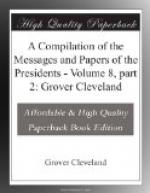four years ago, to wit, California, Connecticut, Delaware,
Illinois, Indiana, Iowa, Kentucky, Maine, Maryland,
Massachusetts, Michigan, Minnesota, Missouri, New Hampshire,
New Jersey, New York, Ohio, Oregon, Pennsylvania, Rhode
Island, Vermont, West Virginia, and Wisconsin, cast
3,982,011 votes now, against 3,870,222 cast then,
showing an aggregate now of 3,982,011. To this
is to be added 33,762 cast now in the new States of
Kansas and Nevada, which States did not vote in 1860,
thus swelling the aggregate to 4,015,773 and the net
increase during the three years and a half of war
to 145,551. A table is appended showing particulars.
To this again should be added the number of all soldiers
in the field from Massachusetts, Rhode Island, New
Jersey, Delaware, Indiana, Illinois, and California,
who by the laws of those States could not vote away
from their homes, and which number can not be less
than 90,000. Nor yet is this all. The number
in organized Territories is triple now what it was
four years ago, while thousands, white and black, join
us as the national arms press back the insurgent lines.
So much is shown, affirmatively and negatively, by
the election. It is not material to inquire
how
the increase has been produced or to show that it would
have been
greater but for the war, which is
probably true. The important fact remains demonstrated
that we have
more men
now than we had
when the war
began; that we are not exhausted
nor in process of exhaustion; that we are
gaining
strength and may if need be maintain the contest indefinitely.
This as to men. Material resources are now more
complete and abundant than ever.
The national resources, then, are unexhausted, and,
as we believe, inexhaustible. The public purpose
to reestablish and maintain the national authority
is unchanged, and, as we believe, unchangeable.
The manner of continuing the effort remains to choose.
On careful consideration of all the evidence accessible
it seems to me that no attempt at negotiation with
the insurgent leader could result in any good.
He would accept nothing short of severance of the Union,
precisely what we will not and can not give.
His declarations to this effect are explicit and oft
repeated. He does not attempt to deceive us.
He affords us no excuse to deceive ourselves.
He can not voluntarily reaccept the Union; we can
not voluntarily yield it. Between him and us the
issue is distinct, simple, and inflexible. It
is an issue which can only be tried by war and decided
by victory. If we yield, we are beaten; if the
Southern people fail him, he is beaten. Either
way it would be the victory and defeat following war.
What is true, however, of him who heads the insurgent
cause is not necessarily true of those who follow.
Although he can not reaccept the Union, they can.
Some of them, we know, already desire peace and reunion.
The number of such may increase. They can at
any moment have peace simply by laying down their arms




